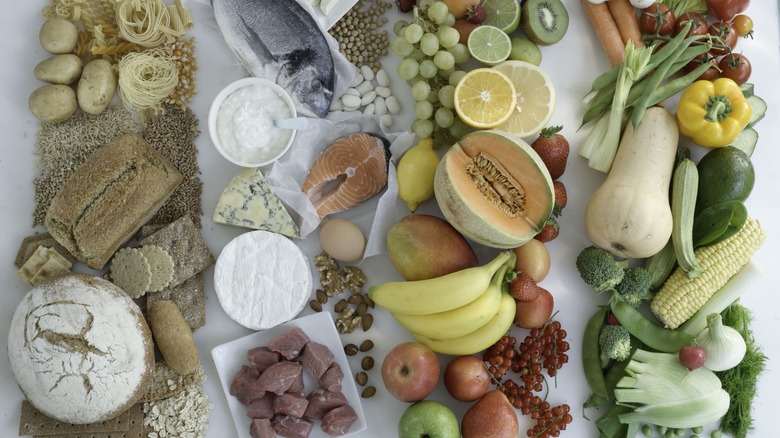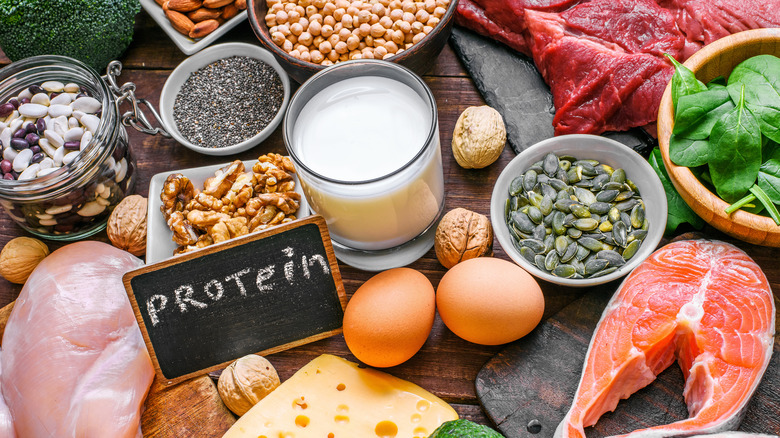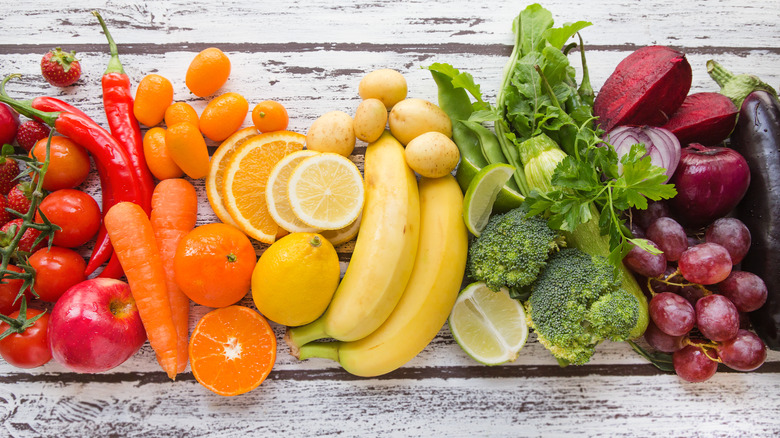Foods To Reach For When You Have HIV
Although the rate of new HIV diagnoses has tapered off in recent years, HIV continues to be a significant public health issue in the United States, reports the Centers for Disease Control and Prevention (CDC). Over one million Americans, predominantly gay and bisexual men, are infected with HIV. And while all racial groups are affected by HIV, Black/African American people have the highest rates of new HIV diagnoses.
According to a 2022 review of studies published in Current Pharmacology Reports, infection with HIV (human immunodeficiency virus) causes damage to white blood cells called CD4 cells, resulting in impaired immunity and higher risk of infections such as tuberculosis and cancers such as lymphomas. Adults with HIV can develop nutritional deficiencies due to diminished appetite, difficulty eating, and impaired nutrient absorption. Malnutrition can play a significant role in lowered immunity to infections. Conversely, good nutrition can strengthen immune function in people with HIV, thus enhancing quality of life and slowing the progression of HIV to AIDS. AIDS (acquired immunodeficiency syndrome) is the late stage of HIV infection that develops when the immune system is severely damaged (via Healthline).
A nutrient-dense and calorie-rich diet is especially important to prevent weight loss — a major symptom of HIV infection, notes Medical News Today. While eating healthful foods (e.g., eggs, lean meats, fish, fruits, vegetables, and whole grains) provides important vitamins and minerals, people with HIV must also be cognizant of food safety and hygiene. A weakened immune system associated with HIV can increase vulnerability to illnesses caused by food or water contaminated with germs such as bacteria or viruses.
Malnutrition and the immune system
A variety of vitamins and minerals as well as protein play an essential role in the growth and function of the cells of our immune system, explains the Harvard T.H. Chan School of Public Health. Diets high in ultra-processed foods and low in fruits and vegetables are lacking in these vital nutrients and thus impair immune function. These nutrient-poor diets rich in refined foods also indirectly weaken immune function by disrupting the balance of microorganisms that make up the gut microbiome. The microbiome interacts with the high concentration of immune cells in the gut. Accordingly, an unfavorable balance of gut bacteria caused by an unhealthful diet can adversely affect the immune system, whereas a healthful diet rich in probiotics and prebiotics promotes beneficial immune responses.
Vitamins A, C, and D and the minerals zinc and selenium play vital roles in maintaining a strong immune defense, notes a review of studies published in a 2015 edition of Food and Agricultural Immunology. A deficiency of vitamin A weakens the ability of immune cells to destroy invading microbes, thus increasing vulnerability to infections. During an infection, levels of vitamin C in the plasma and in certain immune cells rapidly decline, suggesting the vitamin is used up in battling the infection-causing pathogens. Vitamin D is noted for its ability to protect against lung infections by inducing the production of antimicrobial peptides in a variety of immune cells. Even a mild deficiency of zinc can cause atrophy of the thymus gland, which produces infection-fighting T-cells (T-lymphocytes). Notably, a shortage of selenium is linked to HIV progression.
Protein-energy malnutrition in HIV infection
Protein deficiency and associated diarrhea and weight loss (including muscle wasting) usually develops when HIV infection progresses to AIDS, notes a 2019 study published in Missouri Medicine. Calorie needs for energy also increase in people with HIV. Together, protein and energy malnutrition further impair resistance to additional infections in people with HIV/AIDS by reducing the numbers of immune cells such as helper T-cells, cytotoxic T-cells, and natural killer cells.
Per the World Health Organization (WHO), adults with HIV who do not have symptoms requite 10% more calories to maintain body weight and physical activity while adults who do have symptoms or progression to AIDS need 20-30% more calories just to preserve their body weight. Children infected with HIV who lose weight need to consume 50-100% more calories than healthy children without HIV.
The negative effects of protein-energy malnutrition on immune function also include the inability to make new antibodies, thus further increasing risk to infections (via a 2012 review published in Clinical and Developmental Immunology). Without sufficient amino acids — the building blocks of protein — the production of other important proteins in the body is diminished as well. These proteins include clotting factors and acute phase proteins that are secreted in response to infection or inflammation. The synthesis of antioxidants is also impaired, thus leaving cells and tissues defenseless against the damaging effects of free radicals.
Vitamin/mineral deficiencies in HIV infection
Apart from protein and calories, adults with HIV are often deficient in single as well as multiple vitamins and minerals, particularly vitamins A, E, D, B6, B12, and the mineral selenium, according to a 2016 study published in Clinical Nutrition. HIV disease in a person with micronutrient deficiencies has a greater likelihood of rapidly progressing and being resistant to treatment with a combination of drugs. These deficiencies persist even after one year of antiretroviral therapy. Compared with single vitamin/mineral deficiencies alone, deficiencies of two micronutrients concurrently are associated with more adverse consequences.
Among all the essential micronutrients, vitamin A is the most researched vitamin with regard to HIV and its progression, reports Nutrition and HIV: Epidemiological Evidence to Public Health. Vitamin A maintains and strengthens the tissues lining the respiratory and gastrointestinal tracts that function as barriers to infection. Therefore, vitamin A deficiency is strongly tied to infectious diseases and is a serious health issue among people — especially those with HIV — living in regions of the world where animal-sourced foods are less available. Carotenoids are pigments in plant foods that are converted in the body to actual vitamin A (retinol); however, this conversion is not efficient enough to achieve adequate vitamin A levels.
Vitamin D is a major regulator of immune function with potent anti-inflammatory and antimicrobial properties, notes a 2019 review of studies in Frontiers in Immunology. Like vitamin A, a lack of vitamin D is closely tied to HIV infection and disease progression. A deficit of vitamin D is also linked to several comorbidities (e.g., heart disease, osteoporosis, type 2 diabetes) and shorter survival.
High-quality protein
According to the Academy of Nutrition and Dietetics, people with HIV should prioritize protein by adding it to every meal. Protein is high priority because it provides the foundational amino acid building blocks for every cell in the body. It is also essential for the maintenance and repair of the body's cells and tissues. Of special importance to people with HIV, protein is critical for immune function. Like all other cells, protein is required for the body to make immune cells such as macrophages and antibodies, which are key players in immune defense against infections. Good animal sources of protein include meat, poultry, fish, and eggs, while beans and lentils are good choices from the plant kingdom. Fermented dairy foods such as full-fat yogurt and cheese are also excellent protein sources that provide extra health benefits and needed calories as well (via a 2020 research review published in Advances in Nutrition).
Men with HIV should shoot for 100-150 grams of protein per day, while a target of 80-100 grams of protein is sufficient for HIV-positive women (per WebMD). Additional protein over and above the amounts consumed in regular meals may be necessary to reach these levels. For example, nut butters provide protein as well as extra calories from healthful fats. Spreading nut butters such as almond or peanut butter on fruit, vegetables, or toast makes for a tasty snack and protein boost. Another great way to shore up protein intake is to add cheese or canned tuna to foods such as salads, soups, sauces, potatoes, and casseroles. Note: HIV-positive people with kidney disease should limit protein to 15-20% of calories.
Oily fish
Compared to the general population, people with HIV have a high incidence of cardiovascular disease, per a 2016 study published in the journal PLOS One. Supplementation with omega-3 fatty acids in HIV-positive people has been shown to lower blood levels of triglycerides — a major risk factor for atherosclerosis (hardening of the arteries). HIV infection is also associated with high levels of C-reactive protein (CRP), a major marker of inflammation that increases the risk of comorbidities and death in people without HIV, according to a 2020 systematic review published in the journal Cytokine. Omega-3 fatty acid supplements significantly reduced serum levels of CRP in people infected with HIV. When omega-3 fats are consumed, they become part of the body's cell membranes ("you are what you eat"). This beneficial change in the composition of the cell membrane results in less production of pro-inflammatory molecules such as certain prostaglandins. Omega-3 fats also work by suppressing the expression of genes that drive inflammation.
Although supplements of omega-3 fats were used in the studies above, oily fish (canned, fresh, or frozen) are a great dietary source of omega-3s as well as high-quality protein, notes Medical News Today. People with HIV can boost their intake of anti-inflammatory omega-3s by eating at least two servings per week of oily fish such as salmon, sardines, trout, tuna, mackerel, and herring.
Colorful fruits and vegetables
People with HIV should consume a variety of fruits and vegetables, reports WebMD. Fruits and veggies are important sources of vitamins and minerals, many of which function as antioxidants that support the immune system by protecting immune cells against free radical damage. Making half of your plate fruits and veggies makes it easier to meet the recommended 5-9 servings per day, thus avoiding any confusion about serving sizes.
Eating a rainbow of colorful fruits and vegetables provides a wide range of plant pigments called polyphenols (via a 2019 review article published in the Journal of Nutrition and Metabolism). Leafy greens such as spinach as well as blue-purple fruits such as grapes and blueberries are rich in polyphenols. Due to their antioxidant and anti-inflammatory activity, polyphenols protect against age-related chronic diseases such as cancer, neurodegenerative diseases, and cardiovascular disease, notes a 2013 review in Current Drug Metabolism. Thus, colorful fruits and veggies rich in polyphenols may be especially beneficial for people with HIV who are at risk for complications such as cancer, cognitive decline, and dementia. Moreover, polyphenols may even exert a direct effect on HIV by disrupting the replication of the virus.
Aged cheese
As a good source of high-quality protein and calories, cheese can be a valuable part of balanced eating plan for people with HIV, reports Medical News Today. For example, cottage cheese can be paired with fruit or tomatoes, while cream cheese on a bagel is a long-time favorite breakfast meal. Topping a baked potato, broccoli, or an omelet with shredded or grated cheese is a great way to boost protein intake. Cheese can be a tasty addition to soups and sauces as well.
Among the many types of cheeses, aged cheese has some unique qualities. Some foods contain compounds that provide health benefits beyond their nutritional value, notes a study published in a 2017 edition of Food technology & Biotechnology. These foods are called "functional foods," and aged cheese is a good example. Hard, aged cheeses (e.g., Parmigiano Reggiano and Grana Padano) are a rich source of biologically active peptides. The formation of these peptides increases during the ripening of cheese as casein proteins — the predominate proteins in cheese — are broken down into smaller fragments. Some of these peptides can stimulate immune function. In fact, a specific peptide identical to a peptide from casein has been used in immunotherapy for HIV infection. Since aged cheese is lactose-free, it is suitable for HIV-positive individuals who are lactose intolerant.
Yogurt
Yogurt is another dairy food that provides high-quality protein as well as vitamins and minerals that are beneficial for people living with HIV or AIDS (via Medical News Today). Yogurt is great by itself or mixed with cereal or fruit. As a soft food, eating yogurt is a convenient way to satisfy protein needs for people that have difficulty swallowing. According to Consumer Reports, creamy, whole-milk yogurt appears to have a nutritional advantage over low-fat yogurt, particularly with regard to heart health. Since people with HIV require extra calories to maintain lean body mass (per WebMD), full-fat yogurt can help deliver the goods.
Of course, yogurt is best known as a probiotic food. The friendly bacteria in yogurt are linked to several health benefits including stronger bones and improved blood pressure, notes Healthline. In a 2022 study published in the Journal of Biomedical Science, HIV-positive patients on drug therapy who also consumed yogurt with beneficial Lactobacillus acidophilus had a significantly improved CD4 count — a strong indicator of immune function. The patients who supplemented therapy with yogurt also had considerable improvement in levels of antioxidant enzymes, thus fortifying the body's defenses against oxidative stress caused by free radicals. Yogurt was also linked to a substantial reduction in biomarkers of inflammation and levels of deoxyguanosine (8OHdG) — a marker of cancer risk.
Eggs
Eggs are an exceptional protein-rich food loaded with vitamins and minerals that support immune health in HIV-positive people (per WebMD). Since individuals with HIV may have a weakened immune system, it's important to always eat cooked eggs, never raw. Like aged cheeses, the egg is a functional food containing bioactive compounds that contribute health benefits and decrease risk of chronic and infectious diseases (via a 2015 review published in the journal Nutrients). Some of these compounds are proteins that exert antimicrobial, antioxidant, anticancer, and immune modulating effects.
Other bioactive compounds in eggs include the essential nutrient choline and the carotenoid pigments lutein and zeaxanthin. Choline plays an essential role in the structure of cell membranes as well as brain and nervous system function. Lutein and zeaxanthin from eggs are concentrated in the retina where they function as antioxidants to filter out harmful blue light. These pigments have been shown to slow the progression of immune-mediated macular degeneration and the development of age-related cataracts.
Egg protein has the highest biological value and a high concentration of leucine, continues the review. Leucine is the key amino acid for stimulating muscle protein synthesis and inhibiting muscle protein breakdown. Thus, egg protein can help HIV-positive people maintain critical muscle mass.
Whole grains
Whole grains are good sources of energy, B vitamins, selenium, and fiber, reports WebMD. They are especially important for people with HIV since micronutrient deficiencies, including B vitamins and selenium, are common in HIV-positive individuals. In general, whole-wheat flour and other common whole grains are good choices; however, HIV-positive people with gluten sensitivity have a more limited selection, though gluten-free brown rice and quinoa are popular options for anyone. People with diabetes, prediabetes, or insulin resistance should minimize consumption of grains and other starches due to their effects on blood glucose levels. Rather, they should opt for non-starchy vegetables as their main source of carbohydrates. While fiber from whole grains is associated with improved health, it has a special importance in people with HIV. High-fiber foods such as whole grains may reduce the risk of lipodystrophy in HIV-positive individuals (via HIV-associated Lipodystrophy). Lipodystrophy is a redistribution of fat tissue whereby fat is lost in some parts of the body and gained in other parts. The condition develops as a side effect of antiretroviral therapy.
Food safety and HIV
Due to lower immune resistance, people with HIV or AIDS have an increased risk of food poisoning, explains FoodSafety.gov. These people need to be very vigilant about food safety to avoid contracting a foodborne illness. If an HIV-positive person does become sick from food poisoning, the likelihood of hospitalization and even death is greater. According to the Academy of Nutrition and Dietetics, precautionary measures include avoidance of raw or undercooked meat, fish, or eggs. Unpasteurized milk or cheese should also be avoided. To get rid of any harmful germs, fruits and vegetables should always be washed, and separate knives and cutting boards are advised when preparing raw meats alongside fruits and veggies. Following food preparation, hands should be scrubbed, and eating utensils must be thoroughly cleaned (via Healthline). Refrigeration is mandatory for meal leftovers or any other quick-to-spoil foods. Proper cooking of foods such as meats to a temperature sufficient to kill all foodborne bacteria is vital. Caution is also advised to avoid contaminated drinking water.












